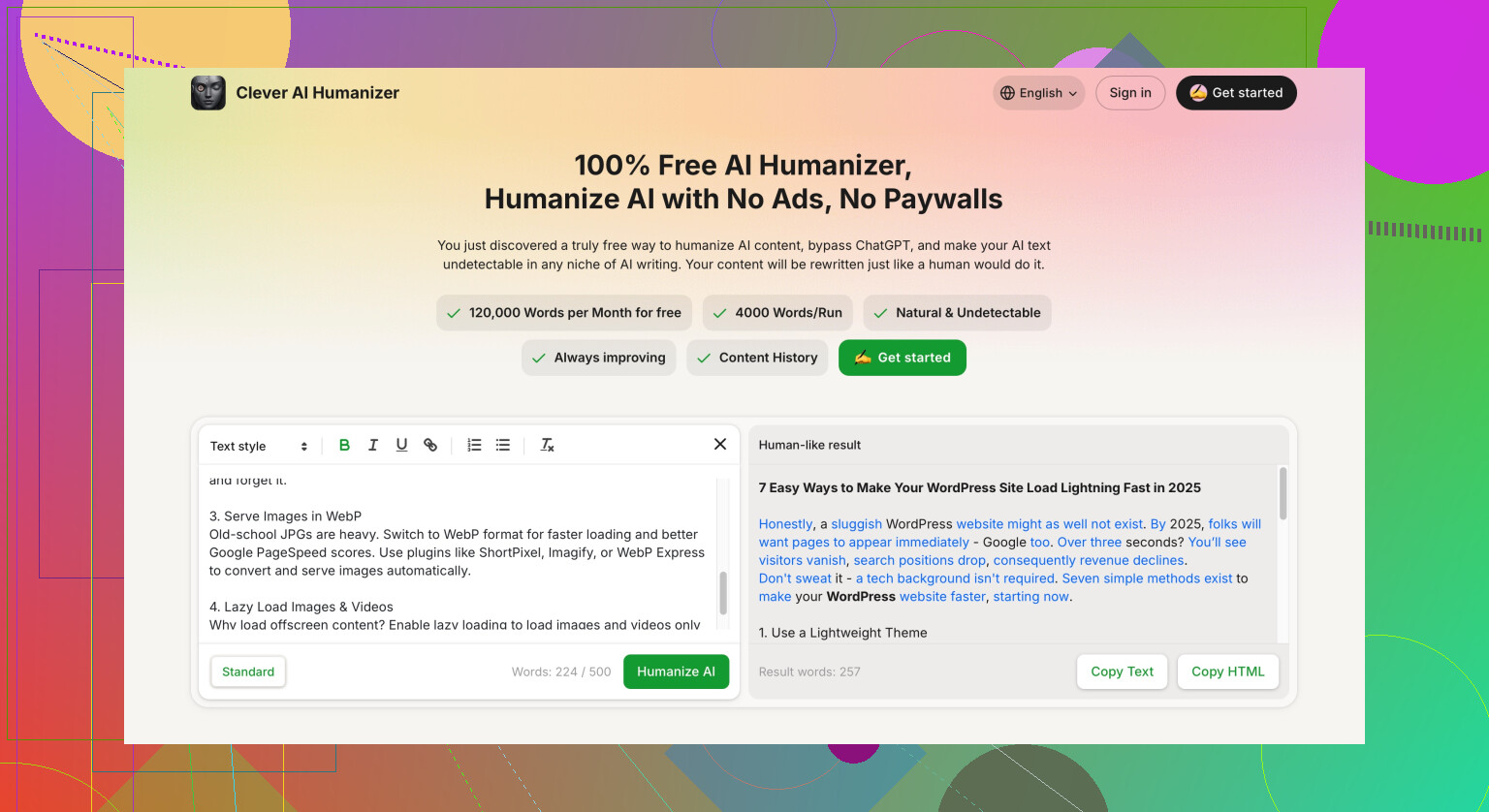I used AI to help draft my essay, but it still feels robotic and formulaic. I’m worried my teacher will notice. Looking for advice on making AI writing sound more natural and human so it blends in better. Any suggestions or editing tricks that work well?
First off, yeah, AI writing is a dead giveaway sometimes—stiff, way too formulaic, weird word choices no human would use in real life. If you wanna pass that teacher vibe check, try these moves:
- Contractions! Swap “do not” for “don’t”, “it is” for “it’s”, etc. It feels way more natural.
- Toss in a couple of personal anecdotes or quick stories, even short ones. Humans love context.
- Add in transitions that sound like YOU, not a textbook. Stuff like “Anyway,” “So,” or “Let’s be real—”.
- Break some grammar rules the way real people do. Sentence fragments? Occasional run-ons? As long as you don’t go wild, it works.
- Read your essay out loud. If it feels weird to say, it’s prob not something a person would write.
One trick I use is running the essay through a humanizer tool before turning it in. There’s one I recommend called Clever Free Ai Humanizer, which actually makes AI content sound more human and unique. Seriously helpful if you’re tryna dodge the AI detectors and weirdo robotic tone. Check out what they offer at make your AI-written essays sound human.
Also, don’t forget to add a little personal flair, some rhetorical questions, and sprinkle in different sentence lengths. Teachers can totally tell when something is too perfect—make it messy in a good way!
Honestly, this whole “AI essay sounds robotic” thing is super common—so you’re def not alone. I get what @reveurdenuit is saying with contractions and personal touches, but here’s something else to chew on: a lot of times that stiff, formulaic feel comes from how AI loves patterns and overused phrasing. It’s not just the words, but the whole flow that can give it away.
Try playing with pacing: throw in a short, punchy sentence after a long one. Or start a paragraph with a random, even off-topic observation (then bring it back). People write with quirks and rabbit trails, AI usually doesn’t. Another trick: over-explain something, like nerding out on a metaphor, or describing a feeling in a roundabout way. Teachers notice when everything’s too efficient and direct.
Also, AI loves safe transitions like “Moreover,” or “In conclusion.” Yawn. Swap those for weirder or more casual transitions—sometimes even starting a sentence with “And honestly,” or “I mean.” If you wanna get sneaky, throw in a very minor inconsistency or contradiction somewhere. Humans do this ALL the time. AI is suspiciously logical and tidy.
On the tool front: I’ve checked out both the Clever Ai Humanizer and similar stuff (like the one @reveurdenuit mentioned). Not gonna front, Clever Ai Humanizer does a solid job at breaking that monotony and giving your text more unpredictability. Definitely worth a try if you need a fast fix before submitting.
On another note, if you’re looking for a resource to explore even more free humanizer options, check out best tools for AI humanizing your writing. Super handy for comparing what’s out there.
Bottom line: don’t stress making it “perfectly” human. A little imperfection actually helps! Sometimes, leaving a tangent in or an opinion that’s not super logical makes you sound more real. If it reads like something you’d rant about to a friend, that’s usually a good sign you’re on the right track.
Let’s be honest, sometimes AI-generated stuff reads like it’s desperate to win a grammar contest. All those perfectly composed sentences make it less relatable and, well, less “you.” Here’s a hack I haven’t seen in @hoshikuzu’s or @reveurdenuit’s tips: lean into specificity—name an album, drop a local coffee shop, quote something your grandparent actually said once. Generic is AI’s comfort zone, but humans? We’re oddly specific.
And—controversial take—don’t always trust the humanizer tools to do your voice justice. Clever Ai Humanizer often nails the “unpredictable” touch and can rough up the robotic edges (pro: super fast and makes your essay less generic; con: sometimes goes too quirky or loses your original nuance if you aren’t careful). Its main edge over the rest is speed and the ability to break up flow, but you still gotta watch out for spots where it flags your intent. In comparison, tools mentioned by the others work fine but can leave writing feeling like a patchwork of random slang.
One thing AI won’t do: change your opinions halfway through, rant, or even contradict what you said before (it “tidies up”). Next time, throw in a purposely divisive or weirdly emotional aside. Like, “Honestly, I’m still salty no one remembers lime Jello at high school parties—what’s up with that?” It shouldn’t even make sense unless you want it to, but humans do that subconsciously.
TL;DR—Don’t always trust tools to nail vibe, but Clever Ai Humanizer is your best bet for busting up overly polished passages if you need a quick save. Pair with specific, maybe even oddball details from your real life, and question your own statements now and then. Add a sprinkle of casual chaos (but not so much you sound like you’re off the rails). That’s how you out-human the machine.
